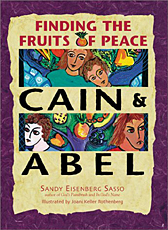In this clear and convincing retelling of the biblical tale of Cain and Abel, jealousy, anger, and fear bring separation and anguish into "God's garden called earth." Cain and Abel are brothers. They have different hair and different heights but the same chestnut colored eyes. Cain is a fruit and vegetable farmer and Abel, a shepherd. They revel in the exotic fruits growing everywhere: orapples, plumelons, pinango, and banangerines. They share a wool blanket at night and eat the same vegetable stew. They even tell each other their dreams. This togetherness creates a cocoon of safety and security.
But then jealousy and anger cause a split between the brothers. They argue over whether God loves farmers or shepherds best. Soon they are no longer sharing anything with each other. Cain's hatred of his brother then leads him to an act of violence. Although Cain soon regrets killing Abel, he cannot undo what he has done. In Sasso's account of this story, the garden of earth feels the aftershocks of Cain's deed: the wonderful and exotic fruits are no more.
This book clearly shows that war results from jealousy, anger, and hatred. Violence destroys human togetherness and sharing and brings death and destruction. But perhaps the most notable and moving message here is that war despoils God's garden of earth and diminishes the marvels of nature. The beautiful folk-art illustrations by Joani Keller Rothenberg help to reinforce this point.
Sasso believes that it is important for people to keep telling the story of Cain and Abel and to learn from it. She ends on a positive note: "Perhaps one day, when each person learns to reach out an open hand without the rock, without the sword, without the gun, the entire world can be saved."
